PART IV
In this section of our course, I address the dilemma of building viable Nation-states in the Post-Colonial World.
Up to now, we have examined several types of nation-state identities–liberalism, fascism, and Leninism–that are fairly easy to pin down. But, what does one do with the many countries that don’t fall easily under these rubrics? Americans frequently lob all of the countries (and problematic countries) into a category called the “Third World.” Perhaps this simplistic depiction of other peoples is due to the fact that Americans travel so much less than than, say, our European counterparts? The problem with a grab-all concept like “Third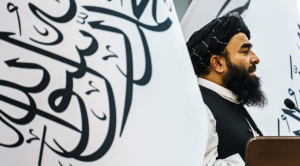 World” is that it obscures the many, many different civilizations that do not lend themselves to easy generalization. After all, it doesn’t make sense–and it simply won’t work–to put countries like Chile and Argentina in the same box as Sudan and Afghanistan.
World” is that it obscures the many, many different civilizations that do not lend themselves to easy generalization. After all, it doesn’t make sense–and it simply won’t work–to put countries like Chile and Argentina in the same box as Sudan and Afghanistan.
The same problems also arise with the new term that has been invented to resolve this confusion: the Global South. True, there are (I think) more developing countries to the South of the Equator. Nonetheless, in terms of categorization, what does one do with highly industrialized, advanced democracies like Australia and New Zealand, and again Chile and Argentina?
My solution to this problem is to narrow our focus by concentrating on a specific category of states that have one thing in common: a relatively experience of European colonization This approach has a notable benefit. Many of the major crises in the world today are at least partly due to the experience of a specific period of European colonialism which began in the second half of the 19th century. These countries include Afghanistan. The country’s most recent take-over by fanatics is one of the greatest, ongoing tragedies of our day.
My focus on the consequences of European colonialism relates directly to my continuing story about the elusive form of political identity known as the nation-state. In this section of the course, we will look at states that are struggling with the challenge of building nation-states, especially democratic nation-states. Some of them are not even states; they are, like Afghanistan, not only failed democracies but failed states.
29. LECTURE: Wednesday, March 29
A comparison of two ideal types: tradition and modernity.
Today’s Assumption: People in the West frequently denigrate the cultures of the inhabitants of traditional societies. Yet, the norms and institutions of traditional society are as rational as those of modern society. They are simply based upon different cognitions and values. Personally, I find some of the attributes of traditional society to be superior to those of modern societies.
A good example of liberal democracy’s problem with the expression of traditional ways of acting is the French practice of Laicité
Angelique Chrisafis, “France’s Headscarf Rule,” The Guardian,” July 2013 READ
Part of the Western tendency to denigrate other peoples and cultures is due to our hubristic conception of our place in history. Remember Weber’s point about how our “Protestant” predecessors regarded themselves as saved by God. To cite one example of our hubris, we repeatedly hear that so-called Third World countries are invariably corrupt. Yet contrary the western knee-jerk assumption that liberal capitalist societies are governed solely by impersonal rules of order, political corruption plays an undeniably present in liberal-democratic societies, too. See here:
See Glen Thrush, “If I’m corrupt, it’s because I take care of my district” READ (Until his death in 2010, John Murtha, the subject of this article, had been the longest serving representative in the House of Representatives. Most likely, this was the result of taking care of a lot of people! But taking care of whom in particular? Ah…).
In the eyes of many people in developing countries, we also have legalized forms of corruption. Consider the relationship between powerful lobbies and political campaigns. Or, in an example that affects the fortunes of Notre Dame athletics, consider the SEC’s exploitation of unregulated Name/Image/Likeness opportunities to pay for the services of “amateur” athletes.
On the positive side, we could also gain a lot by following the example of traditional societies and cultures. Here is an article about how a traditional society’s emphasis on the value of “dependence” could provide a valuable antidote to the dysfunctional consequences of America’s cultivation of the myth of “heroic individualism” Alissa Quart, “Can We put an End to America’s Most Dangerous Myth,” PRINT AND READ
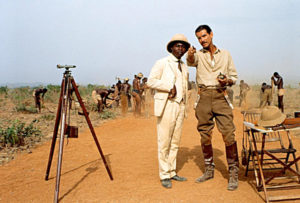
REQUIRED FILM: Please watch the wonderful film, “Mister Johnson.”. Go to our on-line Hesburgh Reserves site
As you watch the film, think about how the protagonist, Mister Johnson, is caught between two worlds and then crushed by the contradictions of this relationship. What are the defining differences between these worlds, and in the case of Nigeria, the domestic contradictions of modern and traditional norms?
30. Discussion Section: March 31.
You will be completing your discussion of Havel on this date. For the topic, see the preceding section on the bottom of this page: Marxism and Leninism.
YOUR SECOND ESSAY ASSIGNMENT
Deadline: Wednesday, April 12 at 9:00 am
.
31. LECTURE: Monday, April 3
Reflections on the brutally tragic and paradoxical consequences of European colonial empires.
Look closely at the historical evolution of western colonial empires on this fascination map of the globe.
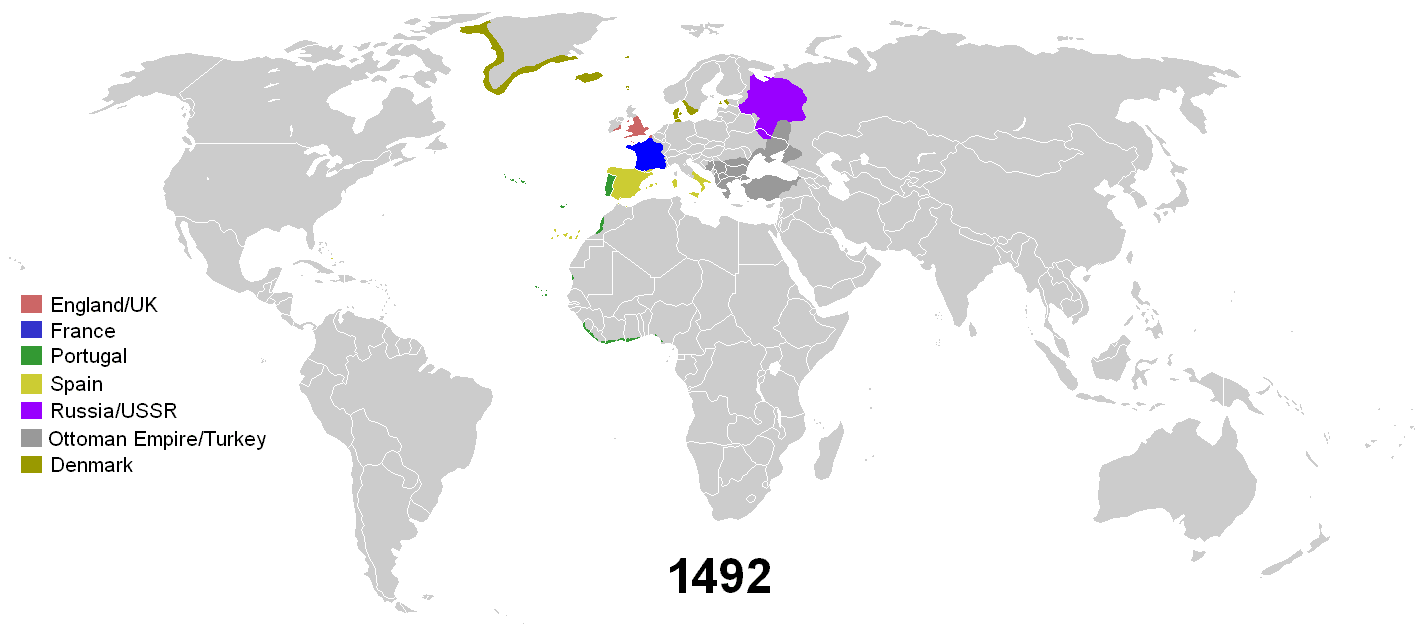
Today’s Assumption: In this lecture, I will focus on colonialism’s role as an external instrument of change. Whether we are talking about the realization of Napoleon’s imperial ambitions in Europe or Europe’s colonial conquests of most of Africa and Asia one century later or the US’s colonial ambitions in the early 20th century, the intrusion of these powers repeatedly challenged the stability and integrity of other peoples and cultures. Well after these powers left, as we shall see in the coming weeks, their continued to be felt for decades and even centuries thereafter. The tragedy of Afghanistan, which I shall discuss today, is a tragedy of colonization and of repeated attempts but consistently failed exercises in foreign domination.
Please read these articles to get a sense for the roots of the tragedy of Afghanistan:
Stephen Tanner, “Indomitable Afghanistan: Why the country remains unconquered” READ
Carter Malkesian,”What America didn’t understand about its longest war,” Politico, July 6, 2021 READ.
32. LECTURE: Wednesday, April 5:
Reflections on the sensible logic of peasant society.
Today’s Assumption: There are more peasants in the world than any other social group. The organization of peasant societies makes more sense than we might imagine. It relies upon a conception of reality known as the “limited good.” The “limited good” is neither good nor bad. It is simple one way of looking at the world.
Assignment: Read George Foster’s seminal article and the newspaper piece below and ask yourself what the advantages and disadvantages of an ideal-typical peasant society would be.
In reading Foster’s challenging article (from which I have included excerpts), keep in mind that his style of argumentation bears all of the earmarks of western condescension toward traditional societies. Still, there is a lot of truth to his argument. Also, his conclusions can be read in a way that is not condescending at all. One way to counter the western bias is to identify ways in which a “limited good” mentality is present in our own society. For example, consider the competitive behavior of high school students aspiring to get into the best universities. In the words of a great revolutionary, “many are called, but few are chosen.”
George Foster: “Peasant society and the image of the limited good” PRINT AND READ
Sara Sidner, “Brothers share wife to secure family land” READ
On the rational logic behind primogeniture: READ
Then, read about the massive migration of peasants from the land into the cities, a quintessential example of the conflict between traditional and modern societies.
Eugene Linden, “The exploding cities of the developing world,” Jan-Feb;75(1), 1996: 52-65. Search through Hesburgh Library On-line journals and PRINT and READ
US citizens migrate too!
And why not encourage all kinds of people to migrate permanently to South Bend? We now have a labor shortage in the US. Economists agree that the availability of labor is essential for economic growth. We could bring desperately needed labor resources to our region. And, it will certainly help my home value.
D’Vera Cohn, “About a fifth of U.S. adults moved due to COVID-19 or know someone who did,” Pew Research Center, July 6, 2020 READ
In the truest spirit of the celebration of Easter, begin reading Carolina Maria de Jesus, Child of the Dark. De Jesus is a child of Jesus. Her extraordinary diary is directly related to the Easter celebration.
EASTER BREAK
Friday, April 7 – Sunday, April 10
33. LECTURE: Wednesday, April 12
Reflections on a global problem—poverty—and its implications for life, society, and politics.
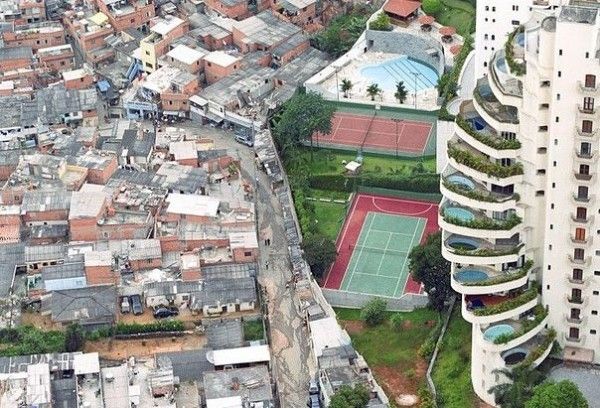
Today’s Assumption: Being poor is a way of life for most people in the world. No student at the University of Notre Dame should be indifferent to the plight of the poor, especially while living on one of the most conspicuously affluent campuses in the world! In addition, poverty is not only a problem for other peoples. It is a problem for Americans as well because it is deeply embedded in our society, indeed arguably to a much greater extent than in any other modern industrial democracy.
Assignment:
For today’s class, please read at least the first half of Carolina Maria de Jesus, Child of the Dark. De Jesus’s story is painfully revealing. As you read it, try to imagine what you would do if you found yourself in her shoes. Keep in mind that Carolina Maria was a living, breathing human being, just like you; she had nothing–often not even food in her stomach–and she somehow managed to write this incredible diary.
Carolina Maria de Jesus, Child of the Dark.
Ana Swanson, “You might be among the richest people in the world and not realize it” Washington Post READ
Gapminder: Look HERE for some of some very cool sources of information about international inequality. Gapminder is like an interactive game designed to take you through every imaginable data (e.g., live births, literacy rates, income) relevant to comparisons between the developed and developing world. For some of the topics, you can even manipulate the information over time, going back hundreds of years. I could play around with this device all evening.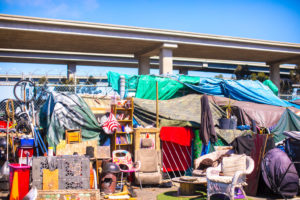
The US has shantytowns, too. Many are are the result of domestic migration and homelessness. Cities like Oakland and San Francisco are overwhelmed by the internal movement of citizens from one location to another.
Highly Recommended: Eve Bratman, “Development’s Paradox: is Washington DC a Third World city?” HERE (Hesburgh on-line) A superb and provocative article. There are interesting similarities between poverty in the US and poverty in less-developed economies. However, it’s important to ask whether the causes are the same. I think the US is a special case. Other advanced, industrialized democracies have far less engrained poverty than the US. How would you explain this disparity?
34. DISCUSSION SECTION: Friday, April 14
She brought forth her firstborn son, and she wrapped him in bands of cloth, and laid him in a feeding trough, because there was no room for them in the inn (World English Bible)
What do you make of this passage? How might it relate to our course.
Readings:
Carolina Maria de Jesus, Child of the Dark
What message would Carolina Maria de Jesus want to convey to American citizens?
What is a Roman Catholic’s responsibility to the poor? Leondardo Boff, a key proponent of “liberation theology,” comments: PRINT AND READ
On the “poverty” of voluntourism READ
The inequality of opportunity in America: WATCH I particularly like the reference to John 3: 17-18.
Can Notre Dame be a truly Catholic institution and not practice liberation theology? What would it mean to practice liberation theology. Interestingly, the preeminent figure in liberation theology, Gustavo Gutiérrez, teaches at Notre Dame! See HERE
Paragraph assignment:
“Can Notre Dame be a truly Catholic institution and not practice liberation theology?”
35. CLASS VISIT: Monday, April 17
A conversation about Hope with Mary Kate Battle (ND ’10) of Catholic Relief Services (and yet another survivor of World Politics). Mary Kate is a member of the inaugural class of the Domer Dozen: WATCH
Mary Kate will talk about the challenges of combating poverty and violence in her work with Catholic Relief Services and CRS’s approach to the Catholic concept of Integral Human Development. She will also share some reflections on her current work on helping children who are separated from their families and getting them into safe family environments.
Mary Kate has requested that you read the following material in preparation for her remarks. Also, I suggest that you think about Carolina Maria de Jesus while reading these pages.
Required readings:
Vaclav Havel, “Never Hope against Hope” PRINT AND READ
Catholic Relief Services, “Integral Human Development Framework” READ THROUGH THIS TO ACQUAINT YOURSELF WITH THE TOPIC (This link may require a Chrome Extension. I don’t know what that is, so please let me know asap if it doesn’t work)
Catholic Relief Services, “Changing the Way we Care” READ
I asked Mary Kate to come up with the paragraph assignment for this week’s discussion section. Here you go, and make sure you are caught up on the readings:
What single characteristic or skill would best complement a Havelian sense of hope for a head of state in 2023? How would that enable integral human development for the people residing in that country?
36. LECTURE: Wednesday, April 19
Reflections on a popular form of authoritarian government: Big men with big guns, big appetites, and big mouths, who tell you they can solve big problems.
Today’s Assumption: Western policymakers frequently rationalize life under dictatorial regimes (e.g., Saudi Arabia) as a political necessity. But cozying up to dictators is risky. Can we confidently say that we are the best judges of necessity, especially when we are talking about the quality of other people’s lives? We sometimes forget or ignore the tragic fact that ordinary people must live under these regimes.
Read at least the first two sections of this report, Freedom House, “Global Expansion of Authoritarian Rule”
As you read about the proliferation of these regimes, ask yourself these questions: 1) What is the nature of the authoritarian personality? 2) Why would people support them? 3) Why would people willingly sacrifice some of the gifts of liberal democracy to follow authoritarian personalities?
Let us consider the appeal of authoritarian solutions:
Robert Kagan, “The Strongmen Strike Back, Washington Post, March 14, 2019 PRINT AND READ
The authoritarian temptation can be found in all kinds of settings, even in advanced democracies. One of the great mysteries for me is why people who benefit so much from liberal democracy would want to exchange it for something else. Can you replace liberal democracy with a form of government that doesn’t have its shortcomings while at the same time preserving what you like about it. Consider Kagan’s statement here
” . . .many people focus on liberalism’s shortcomings, the things it does not provide and the things it either weakens or destroys. The thing liberalism does provide — security of the individual’s rights against the state and the community — is easily taken for granted or devalued.”
One of the most common features that authoritarian leaders share is extreme narcissistic personality disorder. In this right conditions, these personality characteristics actually attract people and convince them that they need some a “special” person to lead them. Read about this disorder HERE
Ask yourself whether you have ever encountered such a person. I have. I also study them. This particular pathology sounds quite unattractive. So, why are people attracted to such individuals again and again?
A related reason why people support authoritarian rulers is that the latter have “charisma.” But what is charisma anyway? And is it a good thing when people seem to have it?
Patricia Sellers, “What exactly is charisma?” READ
Alternately, we can imagine circumstances in which charismatic leadership can be a good thing, especially for democracies:
Steve Kolowich, “Why Oprah Could be President” READ
Kolowich suggests that Oprah–definitely a non-authoritarian personality–has something like charisma. Given the moral vacuum in many democratic capitals these days, perhaps Oprah would be a President after all.
37. DISCUSSION SECTION: Friday, April 21
Topic: Havel, Integral Human Development, and Saving the World (concretely)
Mary Kate has provided your paragraph assignment:
What single characteristic or skill would best complement a Havelian sense of hope for a head of state in 2023? How would that enable integral human development for the people residing in that country?
Re-read the reading assignments for Monday, April 17.
